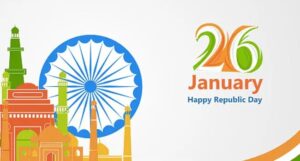Introduction:
In India, Republic Day is a celebration of the country’s diversity, sovereignty, and democratic values rather than just a date on the calendar. Every year on January 26th, people celebrate the day that the Government of India Act (1935) was superseded as the nation’s legal framework by the Constitution of India, which went into force in 1950. This momentous occasion in India’s history represents the country’s transformation into an independent republic in which the people hold the reins of power. Every year, the nation reflects on the values that unite its people as well as its rich history and unique culture as it marks this special anniversary.

Historical Significance:
Studying India’s freedom movement is crucial to appreciating the significance of Republic Day. Under the British Empire, the nation suffered years of colonial rule characterized by exploitation, oppression, and an unrelenting pursuit of independence. Millions of Indians participated in the nonviolent Indian National Movement, which was spearheaded by visionary figures like Sardar Vallabhbhai Patel, Jawaharlal Nehru, and Mahatma Gandhi, in an effort to overthrow British control.
Symbolism of the Constitution:
The Indian Constitution, a magnificent constitution that represents the collective wisdom, ideals, and aspirations of the Indian people, is at the center of Republic Day celebrations. The Indian Constitution, drafted by a group of visionary thinkers led by Dr. B.R. Ambedkar, is the world’s longest written constitution. It establishes the values of justice, liberty, equality, and fraternity as well as the fundamental rights and obligations of individuals. It also lays out the framework for government.
The nation is guided by the Constitution, which establishes the foundation for democracy, the rule of law, and inclusive growth. It represents India’s dedication to social justice, pluralism, and secularism, guaranteeing that every person, irrespective of caste, creed, religion, or gender, has the chance to prosper. Republic Day serves as a poignant reminder of the principles contained in the Constitution and the continuous process of bringing its goals to fruition.
Festivities and Celebrations:
India celebrates Republic Day with a display of grandeur, patriotism, and cultural diversity. The primary event is held in New Delhi, the nation’s capital, where the Indian President raises the flag at the famed Red Fort. Dignitaries, international visitors, and thousands of fans from all around the nation attend the event.
The Republic Day parade’s main attraction is an amazing demonstration of India’s military might, complete with vibrant floats, marching bands, and daring stunts that demonstrate the strength and unity of the country. Vibrant tableaus from several states that showcase each one’s distinct cultural heritage and customs are also a hallmark of the parade. The Indian Air Force performs a stunning flypast to round off the celebration, leaving onlookers in awe of the nation’s technological might.
Republic Day is enthusiastically observed throughout the nation, not only in the capital. To commemorate the anniversary, communities, schools, and colleges host flag-hooping rituals, patriotic musical performances, and cultural events. It’s an occasion for people to unite, declare their continued support for the country, and revel in the diversity of Indian culture.
Harmony among Diversities:
The celebration of India’s diversity on Republic Day is one of its most notable features. India is a cultural melting pot with many languages, faiths, customs, and traditions that coexist peacefully in spite of their diversity. Republic Day reminds us that even though we come from different backgrounds, our shared identity as Indians unites us.
India’s dedication to unity in diversity is a bright example for the rest of the world in a world full of division and strife. Republic Day honors this togetherness and promotes pride in our common history and accomplishments as a nation. It reminds us that despite our differences, we are stronger together, and our diversity is our greatest strength.
Challenges and Aspirations:
India considers the difficulties that lay ahead as it observes another Republic Day. The nation still faces problems with poverty, inequality, corruption, and social injustice despite tremendous progress since independence. For many people, particularly the underprivileged and disenfranchised segments of society, the principles embodied in the Constitution continue to be unattainable.
Republic Day is an opportunity for citizens to stand up for the values of justice, equality, and democracy. It gives one hope for a time when all Indians would be able to live honorably and reach their full potential. The country must continue to uphold the ideals of its founding fathers as it advances, working to create a society that is more wealthy, inclusive, and egalitarian for all.
Conclusion:
In India, Republic Day is a celebration of freedom, democracy, and togetherness rather than just a national holiday. It honors the adoption of the Constitution, a significant period in the country’s history that reaffirmed its dedication to justice, liberty, equality, and brotherhood. While acknowledging its diversity and accomplishments, India also considers the difficulties that lie ahead and reaffirms its commitment to creating a better future for future generations. Republic Day serves as a reminder of the ideals that define the nation and the collective responsibility of its citizens to uphold them.